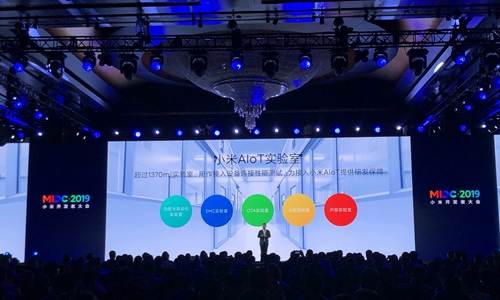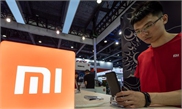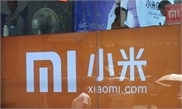SOURCE / INDUSTRIES
Xiaomi bets on 5G, IoT, no direct impact from trade war: executive

Fan Dian, chairman of Xiaomi's Strategic Committee of IoT, speaks at the Mi Developer Conference on Tuesday. Photo: Zhang Hongpei/GT
Chinese smartphone vendor Xiaomi said on Tuesday that it aims to build up the next-generation super internet featuring 5G as well as artificial intelligence (AI) and the Internet of Things (IoT), attracting more developers to its open source ecosystem.
The 5G network will bring huge opportunities to intelligent terminals and more importantly, it will empower IoT, helping to build up the next-generation super internet, said Xiaomi CEO Lei Jun, speaking at the Mi Developer Conference, which kicked off in Beijing on Tuesday.
"The 5G market is set to take off next year," said Lei, and the company will roll out at least 10 types of 5G smartphones in 2020.
Many Chinese smartphone vendors including Huawei and Xiaomi have launched 5G smartphones this year as they vie for a share of the booming market.
Data from the China Academy of Information and Communications Technology showed on Monday that shipments of China's 5G smartphones increased by 401.81 percent month-on-month in October, reaching 2.5 million units.
Cui Baoqiu, vice president of Xiaomi, said during the conference that "we're lucky that we stand at the intersection of AI, the IoT and 5G. China has fostered its own unique advantages in data, talent, hardware, 5G and consumption intelligence."
Along with AI, the development of the IoT sector in China has moved into the fast lane. With the pursuit of the highest performance-price ratio, Lei wants to build up Xiaomi into a transnational brand.
The company is also closely watching the trend of China-US trade tensions, which have affected the high-technology sector. "Xiaomi has not been directly affected by the trade war so far," Cui told the Global Times on the sidelines of the conference.
All technology enterprises in China should beef up investment in research and development and become self-directed to deal with the trade war, according to Cui.
"Xiaomi remains one of the top players in terms of the IoT based on its large number of connected devices and users," said James Yan, Beijing-based research director at Counterpoint.
As of June 30, Xiaomi had 196 million connected devices, up 69.5 percent on a yearly basis. Users who have at least five devices connected to Xiaomi's IoT platform reached 3 million, up 78.7 percent year-on-year, the company said.
During this year's Singles' Day shopping festival on November 11, Xiaomi sold 5.55 million IoT devices, up 148 percent compared with last year's festival.
"Xiaomi has realized almost 100 percent self-development in terms of software for its IoT platform. For hardware, it is cooperating with business partners," Yan told the Global Times on Tuesday.
"Compared with other international companies like Amazon, Google and Apple, Chinese vendors have demonstrated their obvious advantages in manufacturing, ecosystem and huge market demand. But they still lack a mature business model for software such as reading and music services," said Yan.



